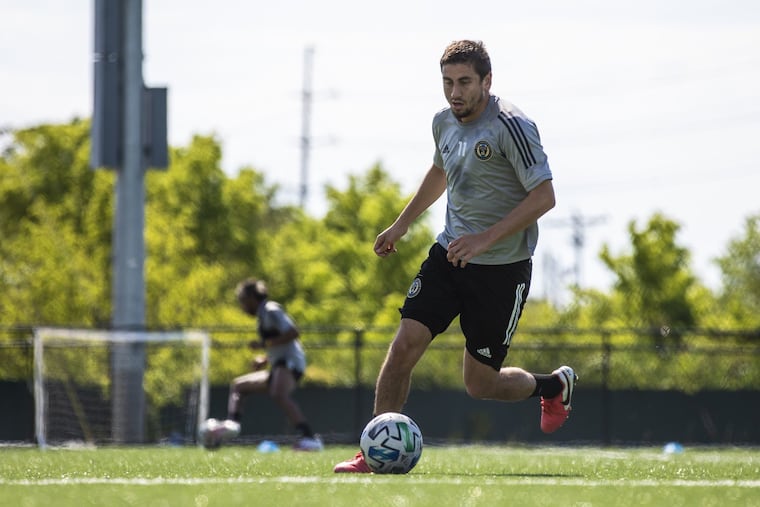Union’s Alejandro Bedoya has plenty to say on MLS’ Orlando plan, Philly protests for police reforms
Bedoya criticized the league's hard bargaining tactics to set up next month's tournament in Orlando. He also gave strong backing to protesters calling for police reform in Philadelphia and nationwide.

Count Alejandro Bedoya among the many MLS players annoyed by the league's hard negotiating tactics in recent days.
“It left a bitter taste in our mouths,” the Union’s captain said of fractious talks between the league and the MLS Players Association to finish a deal to resume games with a tournament in Orlando next month.
Due to financial losses imposed by the coronavirus pandemic, owners wanted to add a force majeure clause to the collective bargaining agreement with the MLSPA. Commissioner Don Garber threatened a lockout to achieve it, sparking outrage from players and fans alike.
"I just think at the end right there, they kind of showed their true colors a bit," Bedoya said. "It [was] disingenuous from their end to pull that, considering that we were already really close. We really thought we were about to have a deal, and they throw that right back at us."
It was a dramatic change in tone from bargaining negotiations this past winter that produced significant improvements in player salaries, travel standards and other areas.
Bedoya is the Union’s player representative to the MLSPA, and one of the association’s leading voices. He saluted his fellow players for standing firm against the league, including a mass boycott of teams’ voluntary workouts Monday and Tuesday.
“We showed, the players’ union, how united we were,” Bedoya said. “I thought we handled it very well, and [the league] backtracked. ... I think they saw they were kind of in the wrong with that action that was taken, and we were able to get a deal done.”
Players especially stood up for those in their ranks with families and children who will be on their own in Orlando for a long stretch. Bedoya is one of them, with a wife and two young kids at home in Fishtown. The league’s initial plans would have had teams in Florida for two months, but players were able to bargain the time down to just over one month.
There is also, of course, the huge question of keeping players safe and healthy during the coronavirus pandemic. Florida has seen a spike in coronavirus cases this week, and on Thursday reported its biggest single-day increase in cases on record.
“We’re not just robots – you can’t just send us down there and expect us to perform,” Bedoya said. “You’ve got to think about us as humans as well. ... It’s not like we’re leaving our families behind under normal circumstances.”
But he was also clear that the players want to work with the league.
“We should all be in this together in terms of wanting to grow the league, wanting to have the league be better," he said.
Speaking out on racial justice
Along with soccer, Bedoya had plenty to say about the protests in Philadelphia and nationwide over racial discrimination and the police killings of George Floyd, Breonna Taylor and other African Americans.
That was no surprise, as Bedoya has long been outspoken about many social issues. Last year, he went viral worldwide for using a goal celebration in a game in Washington to call on Congress to enact tougher gun control laws.
“It’s very moving,” he said. “You feel this energy that they hopefully will bring about change. ... And people are starting to maybe listen. At least, they can’t tune this away.”
Bedoya praised the removal of the Frank Rizzo statue from near City Hall, and called for changes in policing procedures. He also praised the many members of the American soccer community who’ve raised their voices in solidarity.
There was a specific mention for Union and U.S. national team colleague Maurice Edu, an African American, and a story about past conversations between them.
“I’ve been with Mo for a lot, and seen a situation [where] he’s gotten pulled over and they [police] have talked to him differently,” Bedoya said. “These are things that these guys have experienced personally. So it’s important for us to really listen to what they’re saying, how they’re really feeling at this time.”
Bedoya is the son of Colombian immigrants, but freely acknowledges that a passerby on the street “would consider me white.” He also acknowledges the privilege that comes with the status, and the responsibility to stand up for others.
“One thing I’ve seen here in Philly is the diversity of the protesters – and everywhere for that matter – coming together to really amp this movement up and bring about change,” he said. “We just have to continue to support them, listen to them, feel what they’ve really been experiencing. You’ve got to try to put yourself in their shoes, you know, and I think the more and more people who they continue to get a handle on and educate, and people learn from them, the better our society will become.”